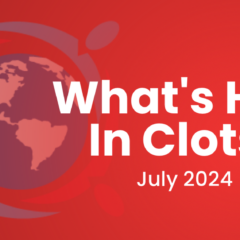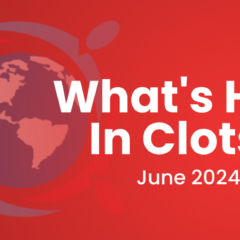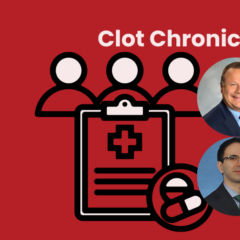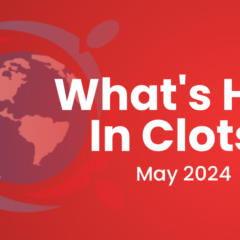Last updated on
What’s Hot in Clots – December 2023
Key Updates in Thrombosis
Table of Contents
- Enthusiasm for factor XI/ XIa inhibitors, but we need to be cautious
- Apixaban for subclinical AF? Is ARTESiA different from NOAH-AFNET-6?
- Dropping aspirin in patients with HeartMate-3: Less is more
- More transfusion seemingly better than less in patients with history of MI: More is more?
- High-sensitivity vs regular troponin for risk stratification of patients with PE: Less is more?
We were in Philadelphia for AHA 2023, and there was a lot of great science!
In case you missed any of the big trials, here are my picks of the month:
Enthusiasm for factor XI/ XIa inhibitors, but we need to be cautious
As covered in a recent video interview, results of the Phase II AZALEA TIMI-71 trial were presented by NATF’s President, Dr. Christian Ruff, at AHA. The findings suggested that there was no significant difference between abelacimab and rivaroxaban for efficacy outcomes, but that there was a marked reduction in bleeding events, particularly GI bleeds. I also interviewed Dr. Manesh Patel, who was equally enthusiastic. However, this month was not all good news for proponents of the hypothesis of dissociating thrombosis from hemostasis. The DSMB for the phase III OCEANIC-AF trial halted the study prematurely due to inferior efficacy compared with apixaban.
Apixaban for subclinical AF? Is ARTESiA different from NOAH-AFNET-6?
On a first look, one may think that the findings from the ARTESiA trial of anticoagulation with apixaban was far different from those of NOAH-AFNET-6, which we covered previously. A closer look, however, indicates that the two trials indeed had directionally similar results. Dr. Renato Lopes, one of the PIs of ARTESiA shared interesting thoughts with me during a video interview. As he alluded to (and I personally agree), an individual patient-data meta-analysis is really helpful to identify the subgroups in whom there is net benefit, i.e., substantive reduction in stroke without a marked increase in bleeding after initiation of anticoagulation for device-detected subclinical AF.
Dropping aspirin in patients with HeartMate-3: Less is more
In the ARIES-HM3 trial, dropping aspirin from the antithrombotic therapy regimen in patients with a left ventricular assist device led to substantial reduction in nonsurgical bleeding, without an increase in stroke or other thrombotic/embolic events. What I particularly liked about this trial was that aspirin was compared with placebo (rather than an open-label, no-treatment group). I also got a chance to quickly discuss the trial with Dr. Connors, one of the trialists, during AHA.
More transfusion seemingly better than less in patients with history of MI: More is more?
Results of the NIH-funded MINT trial were also presented at AHA. The study suggested that in patients with myocardial infarction (MI), a more liberal transfusion strategy (transfusing when Hb is less than 10 g/dL) is likely better than a restrictive transfusion strategy (of transfusing when Hb is less than 7-8 g/dL). Okay, if you are a nitpick, you would think that the lower bound confidence interval for the primary outcome was 0.99 with a P-value of 0.07 (yes, not hitting the magical 0.05)! But the Bayesian in my mind found this trial very helpful.
High-sensitivity vs regular troponin for risk stratification of patients with PE: Less is more?
High-sensitivity troponin assays are replacing regular (sensitive) troponin tests in many health systems. However, most of the clinical evidence on the utility of troponin for risk stratification in PE comes from the regular troponin assays. In this post-hoc analysis of a multicenter prospective study of hemodynamically stable patients with PE, use of high-sensitivity troponin I, compared with sensitive troponin I, did not improve risk stratification or prediction of adverse events – and, in fact, suggested a falsely elevated risk.
For more updates, be sure to subscribe to get the latest updates each month.
Find this information helpful? Please consider making a small donation in support of thrombosis education & resources.

Behnood Bikdeli, MD, MS
Cardiologist, Section of Vascular Medicine, Division of Cardiovascular Medicine, Brigham and Women’s Hospital
Investigator, Thrombosis Research Group, Division of Cardiovascular Medicine, Brigham and Women’s Hospital
Instructor, Harvard Medical School
Investigator, Yale/ YNHH Center for Outcomes Research and Evaluation, Yale School of Medicine
Investigator, Cardiovascular Research Foundation



